Being a blogger can be an incredibly rewarding career. Not only do you get to write about things that interest you but you also continue learning and evolving while getting paid to do what you love. Basically, you become an expert in what you love and earn money to tech others.
But if you want to write about something, you first have to become knowledgeable about it. Whether you want to start your own blog or provide content marketing services for other businesses, you need expertise. Otherwise, how will you provide value to your or your clients’ readers?
For example, I became a WordPress blogger for several reasons. For one, I needed a website and taught myself how to build one with the WordPress platform. Secondly, I like writing. Thirdly, I continue to enjoy exploring WordPress and WordPress-related topics.
In addition to that, I really like helping others and sharing my knowledge is a great way to give back to the WordPress community as a whole.
What follows is my strategy to become an expert in virtually any subject to the point of being able to write about it with accuracy and thoroughness.
1. Assess Your Current Knowledge
Before you do anything else, you need to assess your current level of knowledge in your chosen topic. No matter what you’re writing about, you need to figure out what you already know about it. You can use a notebook or start off with a Google Doc or another digital tool. You don’t have to follow the rules of proper grammar here or any specific format. Simply jot down what you already know.
Once you’ve collected that information, it’s time to think about where you’d be able to find out more about this subject. Are there only online or print publications that would be a good place to start your research?
What about books or websites that would help you broaden your knowledge? Are there any scholarly articles on the topic? Make a list of those publications and then you’ll be ready to move onto the next step.
2. Gain a Cursory Understanding of a Subject
Now you have a pretty good idea of your current knowledge on the subject and where you can go to find out more about it. Remember, you’re not trying to become the world’s most acclaimed scholar in this area — just expert enough to be able to write and talk about it with confidence. As such, you need to gain a cursory understanding of what you will ultimately teach others about.
Start by reading the headlines and summaries of articles. This will give you a good idea about different angles you could cover the topic from. It will also give you a good indication of its breadth as well as what people are most interested in learning.
You can then evaluate your basic understanding again. Have you learned anything new? If the answer is yes, you can move on to the next step. But if you don’t feel like you’ve learned anything new, then you might need to dig deeper and expand your list of sources.
3. Narrow the Topic Down to a Single Keyword
Armed with cursory knowledge of your topic, it’s time to narrow it down to a single keyword or idea. If what you are trying to write about is too broad, you might become overwhelmed by the amount of information you have to read. Not to mention, you might not even have the time needed to read and process it all.
Choose a keyword that’s popular enough to generate interest but there’s not so much information on it out there that your article will get lost. There are plenty of online tools like Keyword Surfer, Answer The Public, and others that can help you with keyword research. Our article linked above will also point you in the right direction.
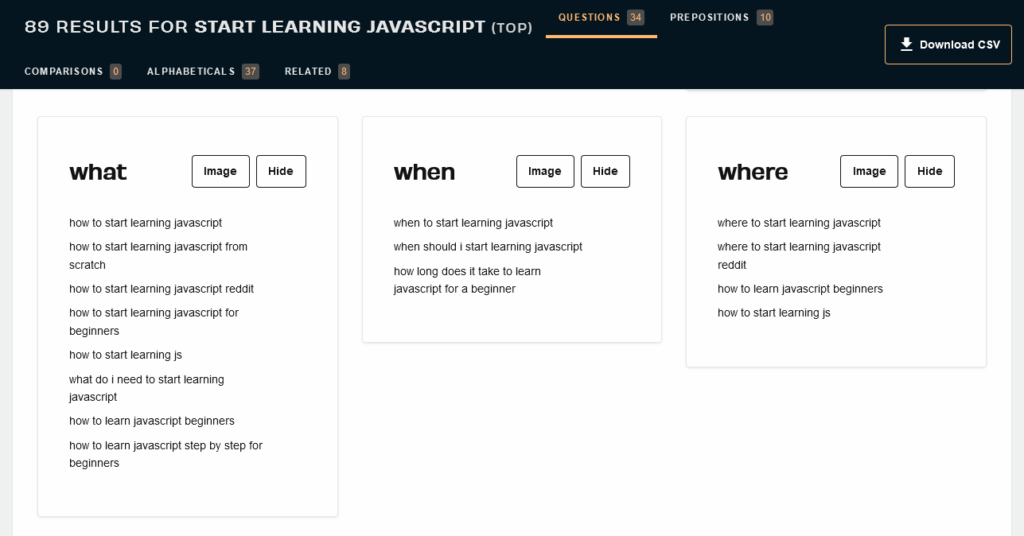
You can even install browser extensions to find keywords worth writing about. A few of those include Keywords Everywhere, SEO Minion, and UberSuggest.
Search For Your Keyword
When you’ve decided on your keyword, open at least the top five articles on that topic that currently exist in new tabs. For example, I often open every article that’s on the first page of search results.
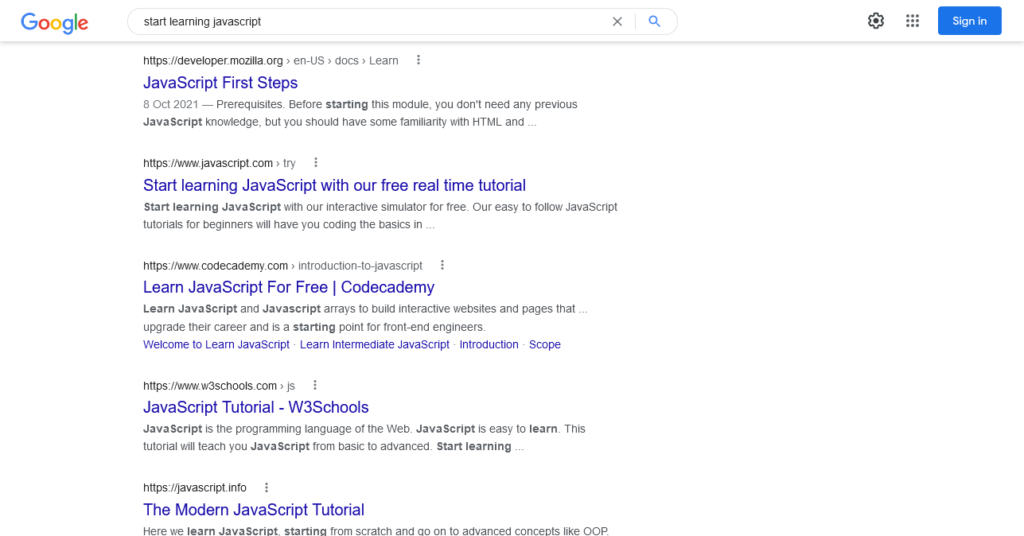
You’ll also want to note down relevant questions from the “people also ask” section. Remember that if you click on one of the questions in this section, the list will expand with even more similar questions and give you even more ideas for your topic.
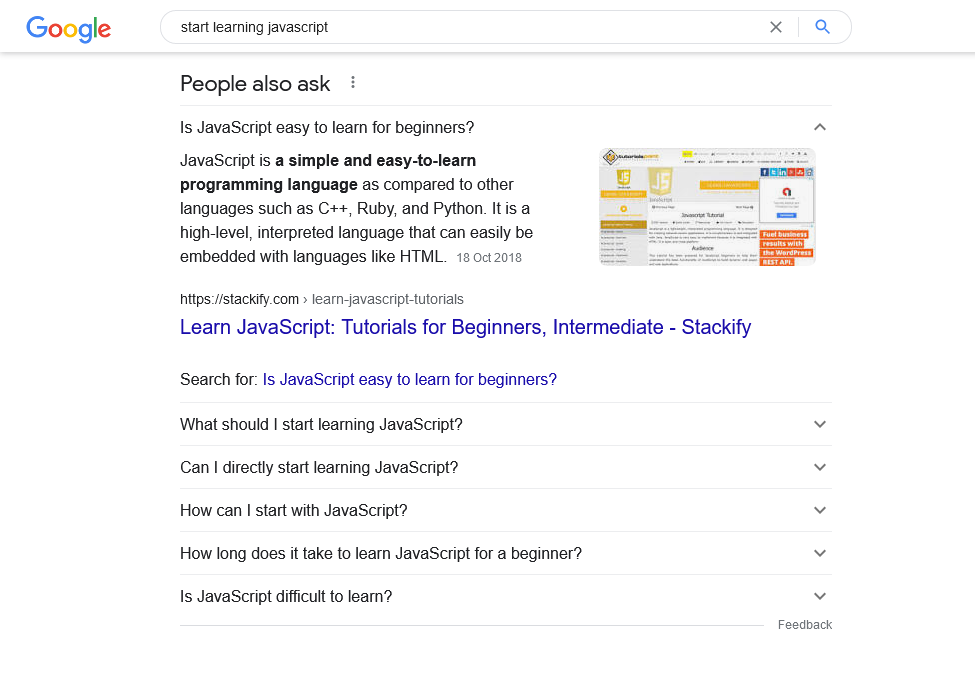
Be sure to also check the related keywords at the bottom of the page. If there are any related keywords that seem relevant to the topic, open them in new tabs as well.
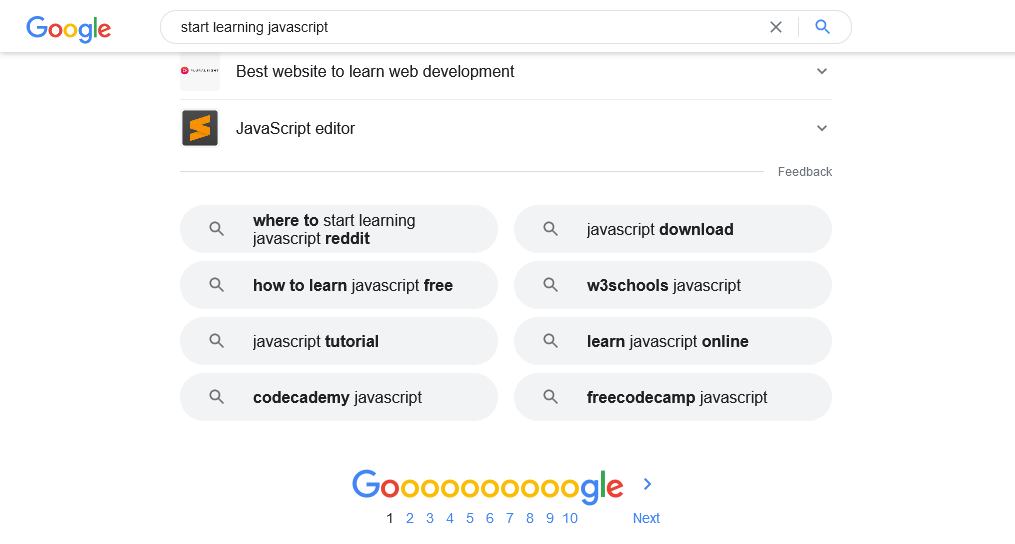
Review Searches for Related Keywords
In some cases, you’ll find plenty of overlap between related keywords and your main keyword. In others, you’ll often find new posts with additional information on those pages. Open them in browser tabs as well and then pull up the first five articles from the first page of the search results.
You can also run those additional keywords through the keyword research tools mentioned above to see how popular they are. This can give you a good idea if you should include them in your article or not.
4. Start Reading!
With your main keyword and all those articles, questions, and related keywords, you should have plenty of material to start on your quest for expert status. The first step, though, is to go through all the material you’ve gathered and actually read it.
If you’re fairly new to the topic, you’ll want to read every article in depth. But if you’re already familiar with the topic you’re writing about and need just a little more knowledge to feel confident in your expertise, you might skim through the parts that cover what you already know.
At this stage, you’ll want to open a Google Doc or new WordPress post in a separate window to take notes. You’ll be using these notes to create an outline for your article.
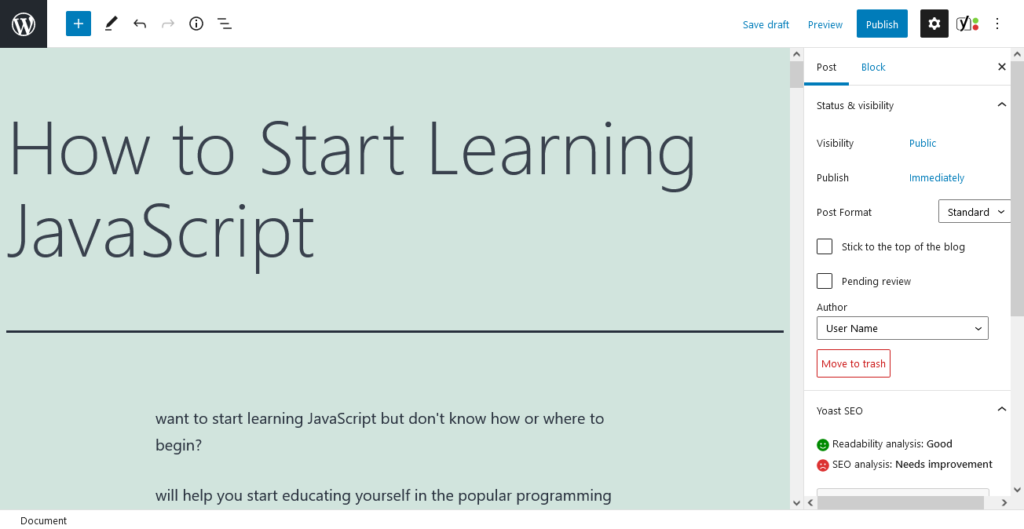
Aside from the content itself, try to pay attention to how the article is structured and try to note down the general length. This can give you an indication of how long your article should be and how deep you need to go.
5. Write an Outline
As you’re reading the articles and other materials, start jotting down notes and putting together an outline.
Again, you don’t have to follow grammar rules or worry about making every sentence sound perfect. What matters more is getting the key ideas down along with main points you want to cover.
In many cases, you can use the keywords and related questions you saw on the search page directly as section headings and subheadings. It’s also common to gather a lot of information from the first article you read. In fact, don’t be surprised if almost half your outline is done at this point. But don’t stop here. Instead, move on to the next post and add information that the earlier posts overlooked.
It’s also a good idea to make a note of sources mentioned in the article so you can double-check the information. In some cases, you might find that the linked source is not the original source of information. Other times, the quoted resource no longer exists. It’s worth going down the rabbit hole and finding the proper source if you want to use it within your article as well.
Take Note of When You Don’t Understand Something
As you’re putting together your outline, you’ll probably come across something you don’t understand. This is more likely to happen if the topic you’re writing about is very new to you. When that happens, take note of it.
This can be a term or a process or it can be information that you think is worth covering or mentioning but it’s not mentioned in any of the articles you came across. Mark those gaps and question marks to fill them in later. Highlight them, use a different color or add a heading in all caps so you don’t forget it. I like to mark those instances with either a question mark or notes in square brackets.
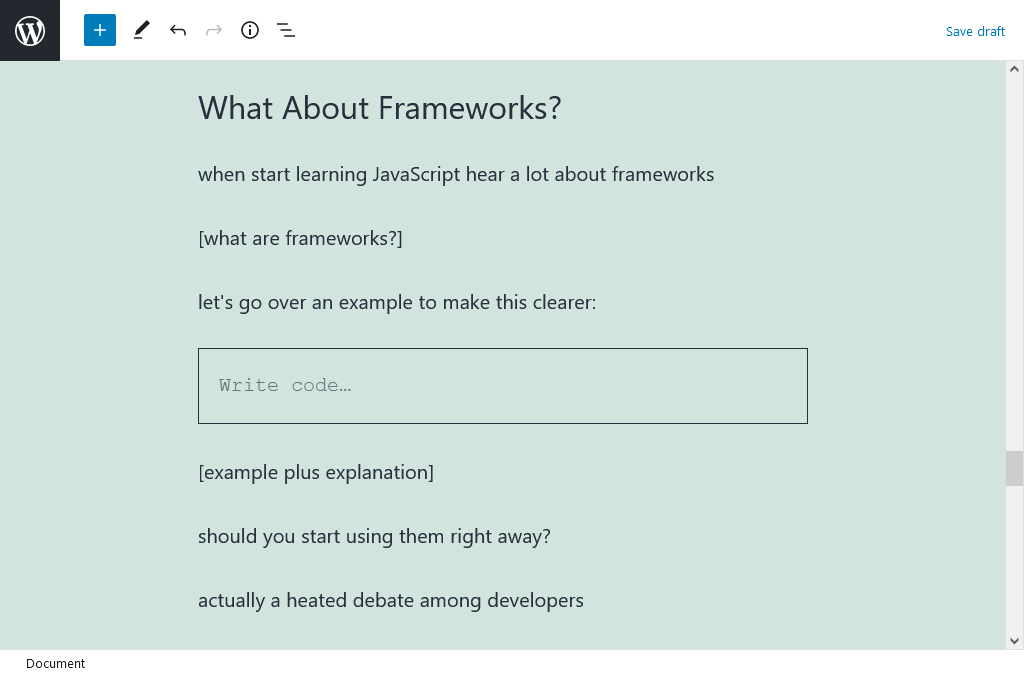
6. Review Your Outline
After this process, you should end up with a pretty thorough outline of your topic. Now it’s time to review it. Go through the entire thing again. Figure out if some of the information could use a better structure and if it follows a logical sequence.
Feel free to move sections around if it feels like the article would flow better that way. At this point, nothing is set in stone and you’re still in the planning and preparation stages.
If there are things you didn’t understand previously, now is the time to turn to Google and fill in those information gaps.
Make sure you are confident in your understanding of the matter. You need to be able to become enough of an expert in the subject so you can explain it to someone else. If you can’t do that effectively, it’s likely that you have more information gaps to fill.
At this point, you can refer to any additional sources you’ve gathered or you can go through the steps described above to broaden your knowledge even more.
7. Write with Confidence
Now that you’ve done enough research, you should be able to write with authority on a subject. The key is to relay this in your writing. Speak with authority. And if you are unsure, lean on the expertise you’ve compiled to back up your claims.
When it comes to writing, don’t expect to nail it one go. In fact, it’s often better to write the first draft using your outline and then walk away from it. As you’re writing that first draft, don’t focus on being grammatically correct. Get it all out on the paper — most seasoned writers refer to this as “vomit draft”.
Mine will regularly include German words and expression if I can’t come up with the correct English equivalents in the moment. Nobody but me will see this so there is no need to be meticulous about it. I also won’t input any links before the editing phase and instead simply underline words that I want to add a link to later.
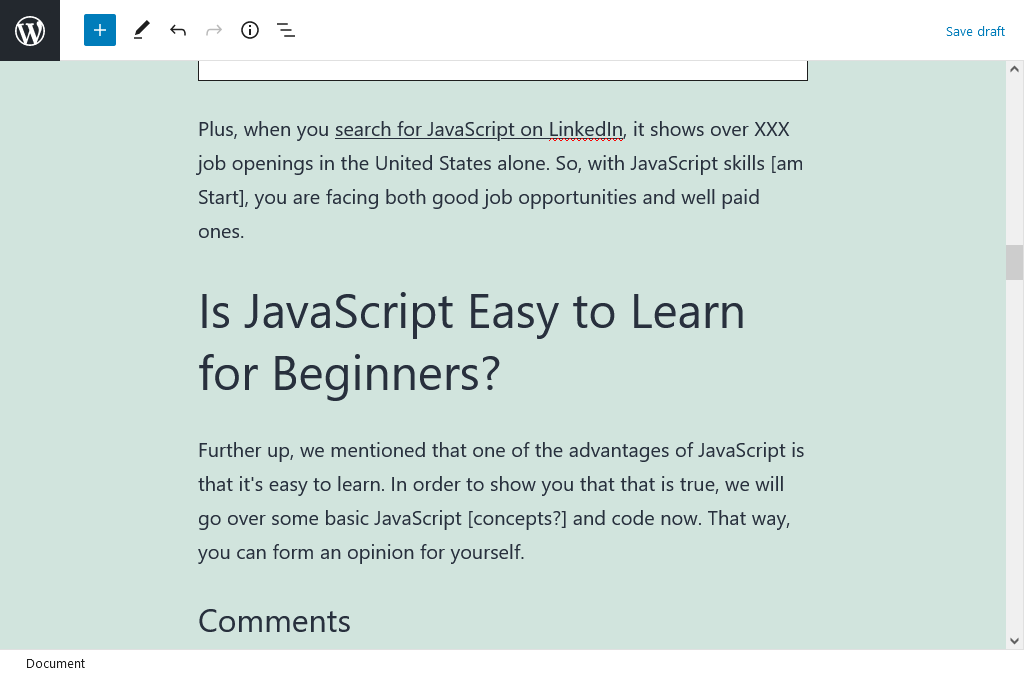
Resist the urge to self-edit — that part comes later on. Just focus on fleshing out the ideas from the outline and getting it all down into your document. You can use a separate doc for your draft so you can refer to your outline easily or you can write it below the outline.
When you’re done with the first draft, take a break and go do something else. Then, come back to it with fresh eyes the next day and go through it.
8. Refine And Edit
The last step in the process is to go through that initial draft you wrote and see what you can improve. Are there any ideas that you could communicate better? Different words or terms you could have used?
Feel free to rewrite sections if they would make more sense that way, change up the words, simplify sentences or expand upon ideas. At this stage, you’ll also want to add any links, statistics or any other information that backs up your claims.
When you’re happy with the article, it’s time for the actual edit process to start. Go through your article one more time to check for spelling errors and any grammatical errors. Make use of tools like Grammarly and the Hemingway Editor to ensure your writing is error-free, clear, and concise. You might also want to run it through an SEO plugin like Yoast SEO to make sure its on-page SEO is on point.
What Will You Become an Expert in?
As you can see, with proper preparation and planning, you can become an expert in any topic. What’s more, if you follow the tips in this article, you’ll be able to write confidently no matter what.
As mentioned earlier, you don’t have to absorb every piece of information on the topic. You just need to know more than the person who will be interested in reading the article. The only thing left to do now is to put these tips to use and embark on your blogging journey. Happy writing!
Do you have additional tips on how to gain enough expertise in unknown topics to write about them? Please share in the comments below!


1 Comment